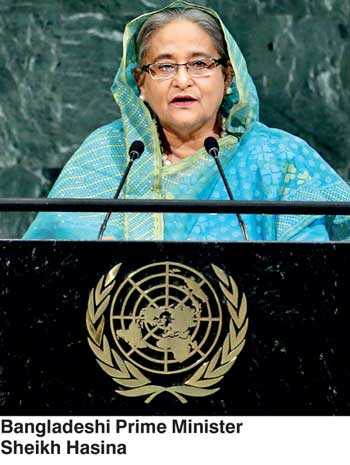Saturday Feb 21, 2026
Saturday Feb 21, 2026
Thursday, 19 April 2018 00:00 - - {{hitsCtrl.values.hits}}
 London (Reuters): Bangladeshi Prime Minister Sheikh Hasina said on Tuesday more international pressure was needed on Myanmar to take back Rohingya refugees, rejecting an assertion claim by the Myanmar government that it had repatriated a family of five.
London (Reuters): Bangladeshi Prime Minister Sheikh Hasina said on Tuesday more international pressure was needed on Myanmar to take back Rohingya refugees, rejecting an assertion claim by the Myanmar government that it had repatriated a family of five.
“The international community needs to put more pressure on Myanmar so that they take back their own people and ensure their security,” Hasina told an audience in London. “Myanmar says they are ready to take back the Rohingya, but they are not taking the initiative.”
UN officials say nearly 700,000 mostly Muslim Rohingya have fled into Bangladesh from Myanmar’s Rakhine state to escape a military crackdown since August, amid reports of murder, rape and arson by Myanmar troops and Buddhist vigilantes in actions which the United Nations has likened to “ethnic cleansing”.
Myanmar has denied nearly all allegations, saying it has been waging a legitimate counter-insurgency operation. Speaking at a separate event in London, Britain’s Foreign Minister Boris Johnson and Canadian counterpart Chrystia Freeland called for a meaningful investigation into reported atrocities. “The (Myanmar) authorities need to demonstrate that they are serious about the safety and security of the Rohingya,” Johnson said.
Hasina said Bangladesh had submitted the names of 8,000 Rohingya families for repatriation to Myanmar, but that Myanmar had so far refused to take them back.
Myanmar and Bangladesh agreed in January to complete a voluntary repatriation of the refugees in two years.
She disputed an assertion by Myanmar that it had repatriated five members of a Rohingya family from Bangladesh, describing them as having been living in the no man’s land between the two countries.
“They were living in the borderlands, with some of their family members in their camps. Maybe (Myanmar) wants to show the world they are taking them back. It’s a good sign. If they want, then why only one family? We have already submitted the names of 8,000 (Rohingya) families, but they’ve not taken them back,” she said.
Hasina also confirmed a plan to move 100,000 Rohingya refugees to an uninhabited low-lying island in the Bay of Bengal, dismissing fears that it would be put them at the mercy of floods.
“We are expecting to move those who are in a vulnerable place to the island. Bangladesh can always be flooding and it does. The camps are very unhealthy. We have prepared a better place for them to live, with houses and shelters where they can earn a living,” she said.
“Where they are living now, the monsoon season is coming up, there can be land erosions, accidents are taking place.” Aid agencies, however, are fearful of the relocation plan and believe it would expose Rohingya refugees to cyclones, floods and human traffickers.